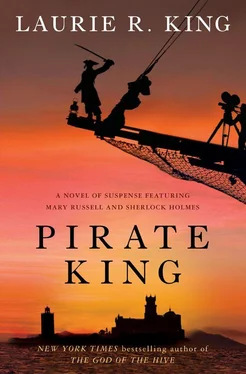The English cast was already with us: Daniel Marks, playing the director and the apprentice pirate Frederic; Bibi, the fictional-director/apprentice pirate’s romantic interest, Mabel (Bibi presented herself as a Parisian-born American, although she was in fact a product of the East End, named Eleanor Murphy). The dual part of Bibi’s fathers – the investor/chaperone and Major-General Stanley – was filled by a red-faced and invariably tipsy Yorkshireman named Scott, a stage actor of Holmes’ era. His twelve other daughters were played by the twelve yellow-haired girls, the symmetry of whom was threatened by the growth spurt of Daughter Five, Edith – it had not been her shoes that made her seem taller, and by the start of filming she would have to bend her knees to fit between Doris and Fannie. The youngest four girls were accompanied at every moment by their mothers, who (as Hale had warned me back in London) constantly jostled for primacy.
I had the impression that Holmes’ original idea – and perhaps Lestrade’s, although he hadn’t the courage to suggest it to my face – had been that I try out for the part of Ruth, the forty-seven-year-old Piratical Maid of All Work who fancies herself as a future wife for her young charge, Frederic. Fortunately for us all, Lestrade had come up with an alternative. My job was to make note of the commands issued by Hale, Fflytte, and Will, the chief cameraman; delete any of Fflytte’s that contradicted one of the other men; delete any of Will’s that went against Hale’s; then see to the implementation of said commands.
Beginning with the hiring of pirates.
I’d only had time for a single exchange of telegrams with Mr Pessoa before we set off from London, although I’d read his previous cables and letters closely. The film industry would be as new a venture for the translator-poet as it was for me; however, on the taxi over, he seemed sanguine that one industry would be much like another in its need for skilled labourers, nourishment for the overfed egos of its principals, and grease on the wheels of communication.
But then, he hadn’t met Bibi or her dozen “sisters.” So instead of checking into my room, I abandoned my luggage and took Mr Pessoa to one side for a review of wants and needs, finding a chair close to a radiator. He took off his hat, but before I could unfold my list, he had a concern.
“I was not given guidelines as to bodyguards.”
“Bodyguards? Good heavens, Mr Pessoa, we’re not working with Rudolph Valentino and Mary Pickford, here. I shouldn’t think the masses of fans are going to make us need bodyguards.”
“These are troubled times, in my country. Your ladies and gentlemen may require-”
“If anyone needs guarding, it’s the populace, not my girls. No, our first order of business is to hire actors.”
He shrugged, and took out a tobacco pouch to roll a cigarette. “I have hired a theatre, posted notices, and taken out advertisements announcing the casting sessions this afternoon.”
“We don’t need a theatre, just a large room,” I protested.
“It was inexpensive, so long as you end each day before their evening performances.”
“How inexpensive?”
He took a sheaf of papers from his inner pocket and showed me various figures, comparing an actual theatre (having both lights and heat) with a bare, cold warehouse. I nodded.
“Very good, thanks. Next, as you may have been told, we’ll need the various accoutrements of pirates.”
He looked puzzled.
“Things like costumes and make-up – you’ll need to help Sally and Maude, two of our crew, find what they need.”
“For pirates?”
“Yes. Didn’t Miss Johns tell you what this picture is about?”
“Not in detail, no.”
“Oh, Lord. Say, I don’t suppose she mentioned to you where she was going?”
“Your telegram was the first I knew that she was no longer with Fflytte Films.”
“Odd. Well, do you know the comic opera The Pirates of Penzance ?”
“I have heard of it, but not seen it.”
Lisbon began to sound appealing. “This picture is about a moving picture company that is making the film version of The Pirates of Penzance . In the process, they encounter actual pirates, based on-”
He sat forward, frowning. “Pirates, both fantasy and authentic?”
“I don’t know how authentic-”
“A picture with two layers of dream. A picture which is itself a dream? Artifice upon artifice …”
The conceit of the film-within-a-film appeared to be exciting some poetical instinct behind that melancholic face: Pessoa’s dark eyes went darker, his cigarette drooped alarmingly close to his knee. He smiled, a dreamy and faraway smile. Before he could either catch fire or reach for his pencil to write down whatever literary inspiration had seized him, I cleared my throat loudly and said, “One of the girls asked me to find a shop in Lisbon where she might buy chewing gum.”
The spell was broken, and we went back to my list, not pausing over a hasty lunch – the steamer having been delayed by the weather, tryouts began a mere three hours after we’d docked. Near the end of the list, if not the meal, Hale and Fflytte came in, both of them tidy and, no doubt, well fed. I looked down at my clothes, the same I had worn off the ship that morning, and at the half-eaten meal, then stood to introduce my employers to their translator.
Pessoa led us under threatening skies along pavements of attractive black-and-white mosaics to the hired theatre, a large, handsome, and surprisingly new building called the Teatro Maria Vitória. I was handed a list of Portuguese names, the men trying out for the parts, and we took our places in the comfortable seats, Fflytte and Hale third row dead centre, with Pessoa and me behind them. The actors had been given a badly roneographed copy of the Major-General’s song for their reading, which would have been a peculiar choice even for native English speakers. After the third man attempted to decipher the blotched printing and the unfamiliar words, Fflytte’s hand came up (lifted high enough to clear the seat-back in front of him) and his voice cut into the stumbling, heavily accented attempt.
“No no no, that’ll never do. Give me anything.”
Pessoa hesitated, then asked, “What does this mean, ‘give me anything’?”
“It means, these are supposed to be actors; have them give me any speech or bit of dialogue they’ve used for a rôle. Any rôle. So I can see what they look like.”
Pessoa addressed the stage with a flood of Portuguese, guttural and sibilant. The actor lowered his sheet and asked something; Pessoa responded. After several exchanges, another face popped around the curtains to make a remark, then several more short, dark men came out until the stage was filled with enough argument to establish a riot scene.
“Enough!” Instant silence, as every face turned towards the astonishingly loud command from the tiny director. Fflytte said to Pessoa, “We want pirates. Tell them to act like a pirate.”
The Portuguese command was terse and to the point. Fflytte settled back into his seat. Pessoa sat down, fishing out his tobacco pouch. I sat back. The man on the stage contemplated the piece of paper he held, folded it neatly into his pocket, then stared at his empty hand as if a sword might appear there. He cleared his throat, raised his head, and lowered his eyebrows into a terrible scowl. “Eu sou um pirata!” he stated, although it came across less of an exclamation than a question.
Hale rested an aristocratic forefinger on his furrowed brow.
I drew a line through the first name on my page.
* * *
One man after another would wander onto the stage, feebly pat at his pockets, take off his hat and search for a place to lay it, put it back on, and then turn to the audience of four, assume a fierce scowl, and declare himself a pirate. After the third such declamation, Pessoa ceased to bother with a translation.
Читать дальше












